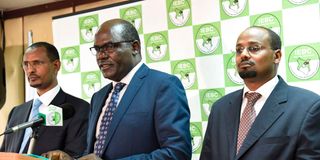Premium
President Ruto signs IEBC (Amendment) Bill 2022 into law

Mr Chebukati together with commissioners Boya Molu and Abdi Guliye. They left office on January 17 after serving a six-year non-renewable term.
President William Ruto is set to form a seven-member selection panel to recruit the Independent Electoral and Boundaries Commission (IEBC) chairman and six commissioners.
The need to set up the selection panel follows the signing into law of the IEBC (Amendment) Bill 2022 after its enactment by parliament.
The law alters the first schedule of the parent Act to change the composition of the selection panel that oversees the filling of vacant positions at the commission.
The new-look selection panel shall include two nominees- one man and one woman- from the Parliamentary Service Commission (PSC) down from four in the repealed law.
The panel will also have one person nominated each by the Public Service Commission (PSC), the Political Parties Liaison Committee (PPLC), the Law Society of Kenya (LSK) and two persons- a man and a woman representing the Inter-Religious Council of Kenya (IRCK).
The law states that a person is qualified to be a member of the selection panel if the person is a Kenyan citizen, meets the requirements of leadership and integrity as provided for in the Chapter Six of the constitution and holds a degree from a university recognized in Kenya.
This means that the Head of Public Service Felix Koskey will officially notify the nominating bodies of the development and invite them to submit their nominees to the panel so that the president can appoint them by way of a gazette notice.
Once inaugurated, the panel will have the task of inviting applications from Kenyans who meet the requirements to be members of the seven-member commission.
Three of the vacant positions were triggered after the IEBC chairman Wafula Chebukati and two commissioners Boya Molu and Abdi Guliye served their six-year nonrenewable term.
The other three vacancies came up after the commission Vice Chairperson Ms Juliana Cherera and commissioners Mr Justus Nyangaya and Francis Wanderi resigned after President Ruto formed a tribunal headed by Court of Appeal Judge Aggrey Muchelule to investigate their suitability over their role in the August 9, 2022, presidential election results.
Ms Irene Masit, who was accused alongside the three, opted to face the tribunal and it is not clear whether she will be let off the hook or forced to follow her other three colleagues.
The law says that at least six months before the expiry of the term of the chairperson or a member of the commission or within 14 days of the declaration of a vacancy in the office of the chairperson or member of the commission, the President shall appoint a selection panel.
The law further states that the selection panel shall consist of seven persons for the purposes of appointment of the chairperson or member of the commission.
In a gazette notice of October 22, 2022, President Ruto formally declared vacancies at the country’s seven-member electoral agency.
Mr Chebukati, Mr Molu and Guliye were appointed at the IEBC by immediate former President Uhuru Kenyatta in January 2017 following their nomination in December 2016.
They were joined by Ms Cherera, Mr Nyangaya, Mr Wanderi and Ms Masit in September 2021 to replace Ms Connie Maina (Vice Chairperson), Ms Margaret Mwachanya, Mr Paul Kurgat and Dr Rosslyn Akombe, who had been appointed alongside Mr Chebukati, Molu and Guliye but opted to resign.
Dr Akombe, who resigned just months to the October 26, 2017, fresh presidential election, accused Mr Chebukati of making unilateral decisions at the commission.
Ms Maina, Mwachanya and Mr Kurgat followed suit in April 2018 blaming Mr Chebukati for highhandedness against some commission staff noting that their continued stay in office was therefore untenable.
But as fate would have it, Ms Cherera, Mr Nyangaya, Mr Wanderi and Ms Masit were accused in the petitions filed in the National Assembly- that led to the formation of the tribunal by the President- of trying to moderate the August 9, 2022, presidential election results.
The petitions accused them of trying to have Mr Raila Odinga, President Ruto’s main rival in the election, either declared the winner or at worst, force a runoff between the two.
The National Assembly adopted a report of its committee on Justice and Legal Affairs recommending the formation of a tribunal to investigate them.





